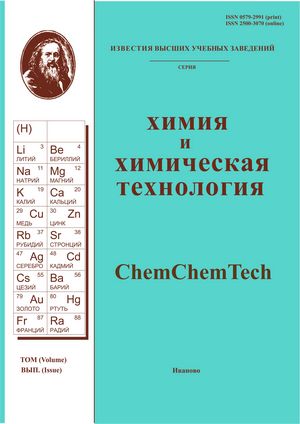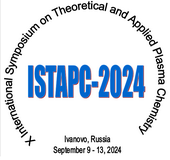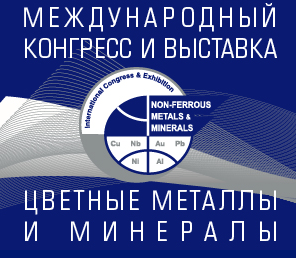ТЕРМИЧЕСКИЕ ПРЕВРАЩЕНИЯ МАЛЬТЕНОВ И МАСЕЛ ТЯЖЕЛЫХ МЕТАНОВЫХ НЕФТЕЙ
Аннотация
В статье рассмотрены изменения состава масел и мальтенов в процессе термического крекинга. Масла и мальтены (смесь Масла+Смолы) были выделены из нефтей двух месторождений: Зюзеевское (Республика Татарстан) и Зуунбаянское (Монголия). Обе нефти относятся к метановым, но отличаются по содержанию насыщенных, ароматических углеводородов, смол, асфальтенов и серы. Крекинг масел и смеси (Масла + Смолы) проводился при 450 °С в течение 120 мин в изотермическом режиме. Получены данные по материальному балансу процесса, составу газообразных и жидких продуктов крекинга. Показано, что в составе газообразных продуктов крекинга как масел, так и смесей (М+С) преобладают углеводороды состава С1-С5. Их содержание независимо от объекта крекинга меняется в ряду: C1 > C2 > C3 > С4-С5. Изучена динамика изменения группового углеводородного состава термолизатов. Показано, что при крекинге масел, обогащенных насыщенными углеводородами, термические превращения углеводородов (УВ) направлены в сторону реакций деструкции, о чем свидетельствует повышенный выход газообразных продуктов. Реакции конденсации являются доминирующими при крекинге масел, в составе которых преобладают ароматические УВ. Показано, что введение смол в сложную многокомпонентную смесь углеводородов приводит к изменению направленности протекания свободно-радикальных реакций крекинга. Различия структурно-групповых характеристик средних молекул смол отражаются на выходе не только твердых, но и газообразных продуктов крекинга смесей (М+С), а также влияют на направленность термических превращений углеводородов. Кроме того, нельзя исключать влияние различий по содержанию насыщенных и ароматических УВ в составе масел на изменения направленности термических превращений компонентов в процессе крекинга смесей (М+С).
Для цитирования:
Воронецкая Н.Г., Певнева Г.С. Термические превращения мальтенов и масел тяжелых метановых нефтей. Изв. вузов. Химия и хим. технология. 2024. Т. 67. Вып. 8. С. 59-67. DOI: 10.6060/ivkkt.20246708.4t.
Литература
Wang F., Wei Q., Li K., Biney B. W., Liu H, Chen K., Wang Z., Guo A. Coke formation of heavy oil during thermal cracking: New insights into the effect of olefinicbond-containing aromatics. Fuel. 2023. V. 336. P. 127-138. DOI: 10.1016/j.fuel.2022.127138.
Ancheyta J., Speight J.G. Hydroprocessing of Heavy Oils and Residua. SPb: TSOP “Professiya”. 2012. 384 p.
Ayala M., Hernandez-Lopez E.L., Perezgasga L., Vazquez-Duhalt R. Reduced coke formation and aromaticity due to chloroperoxidase-catalyzed transformation of asphaltenes from Maya crude oil. Fuel. 2012. V. 92. N 1. P. 245-249. DOI: 10.1016/j.fuel.2011.06.067.
Luo P., Gu Y. Effects of asphaltene content on the heavy oil viscosity at different temperatures. Fuel. 2007. V. 86. P. 1069–1078. DOI: 10.1016/j.fuel.2006.10.017.
Chen X., Li T., Xin L., Yang Y., Shan H., Yang Ch. Inductive effect of basic nitrogen compounds on coke formation during the catalytic cracking process. Catal. Commun.. 2016. V. 74. P. 95-98. DOI: 10.1016/j.catcom.2015.11.008.
Nalgieva K.V., Kopytov M.A. Characteristics of resin and asphaltene destruction products in supercritical water. ChemChemTech [Izv. Vyssh. Uchebn. Zaved. Khim. Khim. Tekhnol.]. 2023. V. 66. N 11. P. 25-31 (in Russian). DOI: 10.6060/ivkkt.20236611.11t.
Pevneva G.S., Voronetskaya N.G. Composition of thermal cracking products of SARA fractions from heavy methane crude oil. Chemistry for Sustainable Development [Khimiya v Interesah Ustoichivogo Razvitiya]. 2023. V. 31. N 2. P. 226-232. DOI: 10.15372/CSD2023460.
Halikova D.A., Petrov S.M., Bashkirtseva N.Yu. Review of the advanced technologies for processing of heavy highly viscous crude oils and natural bitumen. Vestn. Kazan. Tekhnol. Un-ta. 2013. N 3. P. 217–221 (in Russian).
Rogel E., Witt M. Asphaltene characterization during hydroprocessing by ultrahigh-resolution Fourier transform ion cyclotron resonance mass spectrometry. Energy Fuels. 2017. V. 31. N 4. P. 3409–3416. DOI: 10.1021/acs.energyfuels.6b02363.
Kapadia P.R., Kallos M.S., Gates I.D. A review of py-rolysis, aquathermolysis, and oxidation of Athabasca bi-tumen. Fuel Proc. Technol. 2015. V. 131. P. 270–289. DOI: 10.1021/ef900206n.
Chiaberge S., Guglielmetti G., Montanari L., Salvalaggio M., Santolini L., Spera S., Cesti P. Investigation of Asphaltene Chemical Structural Modification Induced by Thermal Treatments. Energy Fuels. 2009. V. 23. N 9. P. 4486–4495. DOI: 10.1021/ef900206n.
Li N., Zhang X., Zhang Q., Chen L., Ma L., Xiao X. Reactivity and structural changes of asphaltenes during the supercritical water upgrading process. Fuel. 2020. V. 278. 118331. DOI: 10.1016/j.fuel.2020.118331.
Nal’gieva K.V., Kopytov M.A., Cheshkova T.V., Krivtsov E.B., Mamontov G.V. Transformation of asphaltenes isolated from heavy crude oil during catalityc and non catalytic aquathermolysis. Neft.Gaz.Novatsii. 2021. V. 247. N 3. P. 13-16 (in Russian).
Nal’gieva K.V., Kopytov M.A. Study of the thermolysis products of asphaltenes from the vacuum residue of Usinskoe oil produced in supercritical water. Solid Fuel Chem. 2022. V. 56. N 2. P. 116-122. DOI: 10.3103/S0361521922020070.
Korneev D.S., Pevneva G.S., Voronetskaya N.G. Effects of the composition and molecular structure of heavy oil asphaltenes on their reactivity in thermal decomposition processes. Petrol. Chem. 2021. V. 61. N 2. P. 152-161. DOI: 10.1134/S0965544121020158.
Boytsova A.A., Baytalov F., Strokin S.V. Study of thermodynamic, kinetic and structural parameters of heavy Yaregskaya crude oil aspaltenes thermolysis. Neftegaz.RU. 2020. N 3. P. 47-51 (in Russian).
Korneev D.S., Pevneva G.S. Composition of the prod-ucts of low-temperature destruction of asphaltenes of heavy oil and oil residues. Chemistry for Sustainable Development [Khimiya v Interesah Ustoichivogo Razvitiya]. 2020. V. 28. N 3. P. 252-257 (in Russian). DOI: 10.15372/KhUR2020226.
Trejo F., Ancheyta J., Morgan T.J., Herod A.A., Kandiyoti R. Characterization of Asphaltenes from Hy-drotreated Products by SEC, LDMS, MALDI, NMR, and XRD. Energy Fuels. 2007. V. 21. P. 2121-2128. DOI: 10.1021/ef060621z.
Neyfel'd A.L., Savinykh Yu.V., Kopytov M.A., Orlov-sky V.M. Electron beam impact on petroleum asphaltenes. J. Siber. Fed. Univ. Chem. 2023. V. 16. N 1. P. 59-65.
Sviridenko N.N., Akimov A.S. Characteristics of products of thermal and catalytic cracking of heavy oil asphaltenes under supercritical water conditions. J. Supercrit. Fluids. 2023. V. 192. 105784. DOI: 10.1016/j.supflu.2022.105784.
Cheshkova T.V., Sagachenko T.A., Min R.S., Kovalen-ko E.Yu. Biogenic oxidation of resin-asphaltene compo-nents of heavy oil. Part1: Asphaltenes. ChemChemTech [Izv. Vyssh. Uchebn. Zaved. Khim. Khim. Tekhnol.]. 2023. V. 66. N 11. P. 110-118. DOI: 10.6060/ivkkt.20236611.12t (In Russian).
Volkova G.I., Kalinina T.V., Morozova A.V. Changes of the asphaltenes structural parameters under the influ-ence of ultrasonic waves. ChemChemTech [Izv. Vyssh. Uchebn. Zaved. Khim. Khim. Tekhnol.]. 2019. V. 62. N 12. P. 71-77 (in Russian). DOI: 10.6060/ivkkt.20196212.6016.
Urazov Kh.Kh., Sviridenko N.N. Influence of In Situ Formed Nickel- and Cobalt-Containing Catalysts on the Mechanism of Conversion of Heavy Oil Asphaltenes. Solid Fuel Chem. 2023. V. 57. N 1. P. 76–81. DOI: 10.3103/S0361521923020155.
Pevneva G.S., Voronetskaya N.G., Grin’ko A.A., Golovko A.K. Influence of resins ad asphaltenes on thermal transformations of hydrcarbons of paraffin-base heavy crude oil. Petrol. Chem. 2016. V. 56. N 8. P. 690-696. DOI: 10.1134/ S0965544116080144.
Pevneva G.S., Voronetskaya N.G., Korneev D.S., Golovko A.K. Study of hydrocarbon thermal conversion in heavy naphthene-base oil. AIP Conf. Proceed. Proceed. of the Adv. Mater. with Hierarchical Struct. for New Technol. and Reliable Struct. 2018. P. 020237. DOI: 10.1063/1.5083480.
Pevneva G.S., Voronetskaya N.G., Korneev D.S., Golovko A.K. Mutual influence of resins and oils in crude oil from the Usinskoe oilfield on the direction of their thermal transformations. Petrol. Chem. 2017. V. 57. N 8. P. 739-745. DOI: 10.1134/S0965544117080126.
Russian Ministry of Natural Resources Order N 3-r dated 01.02 2016. Prilozheniya 1-3.
Pevneva G.S., Voronetskaya N.G., Sviridenko N.N. Cracking of Maltenes of Naphthenic Petroleum in the Presence of WC/Ni–Cr. Petrol. Chem. 2020. V. 60. N 3. P. 373-379. DOI: 10.1134/S0965544120030160.
Pevneva G.S., Voronetskaya N.G., Kopytov M.A. Study of coke formation in SARA fractions by means of thrmogravimetry. Chemistry for Sustainable Development [Khimiya v Interesah Ustoichivogo Razvitiya]. 2022. V. 30. N 4. P. 395-401. DOI: 10.15372/CSD2022396.
Don A.R., Voronetskaya N.G., Grin’ko A.A. Golovko A.K. Effect of resinasphaltene substances on thermal transformations of hydrocarbons from natural bitumen. Vestn. TGU. 2015. N 393. P. 244-249 (in Russian). DOI: 10.17223/15617793/393/39.
Ivanova L.V., Gordadze G.N., Koshelev V.N. Determing mass content of solid paraffins by capillary gas-liquid chromatigraphy. Trudy Gubkin Univer. Nefti Gaza. 2011. V. 264. N 3. P. 61-68 (in Russian).
Dmitriev D.E., Golovko A.K. Transformations of resins and asphaltenes during the thermal treatment of heavy oils. Petrol. Chem. 2010. V. 50. N 2. P. 106-113. DOI: 10.1134/S0965544110020040
Smirnov M.B., Vanyukova N.A., Brodskii E.S. A new type of aromatic petroleum hydrocarbons: phenyl-substituted tri- and tetracycloaromatics. Petrol. Chem. 2020. V. 60. N 3. P. 270-277. DOI: 10.1134/S0965544120030202.



















